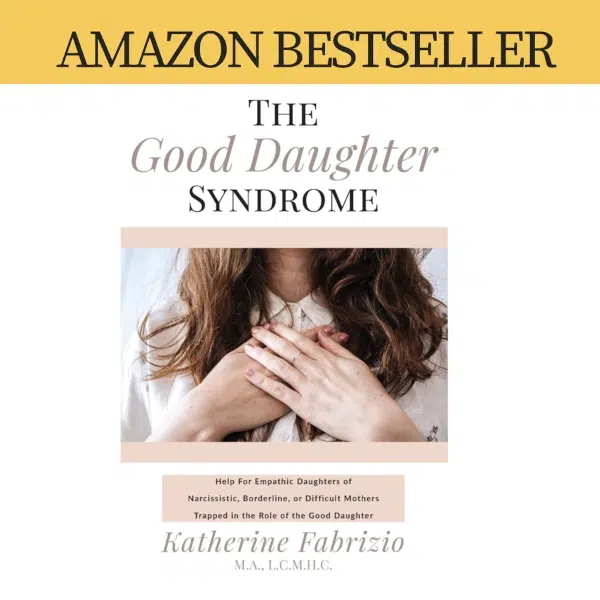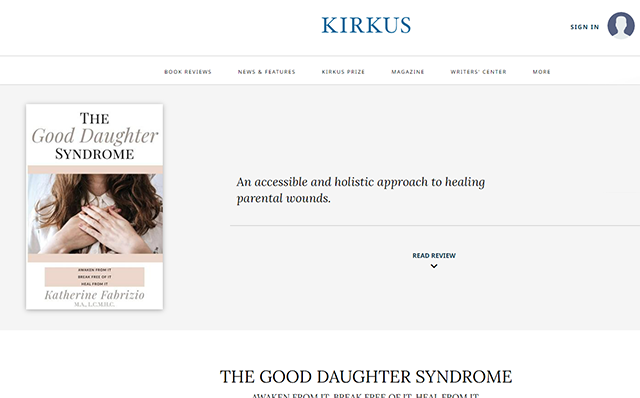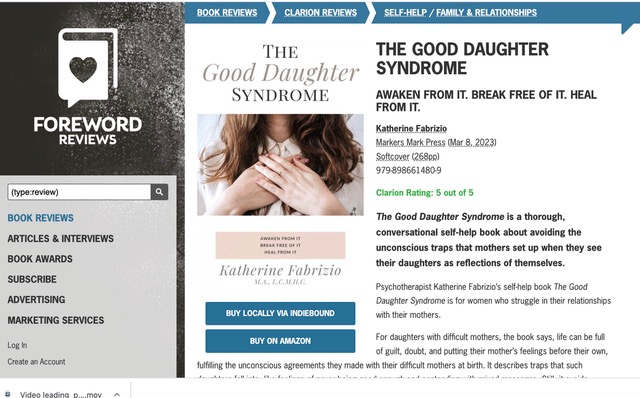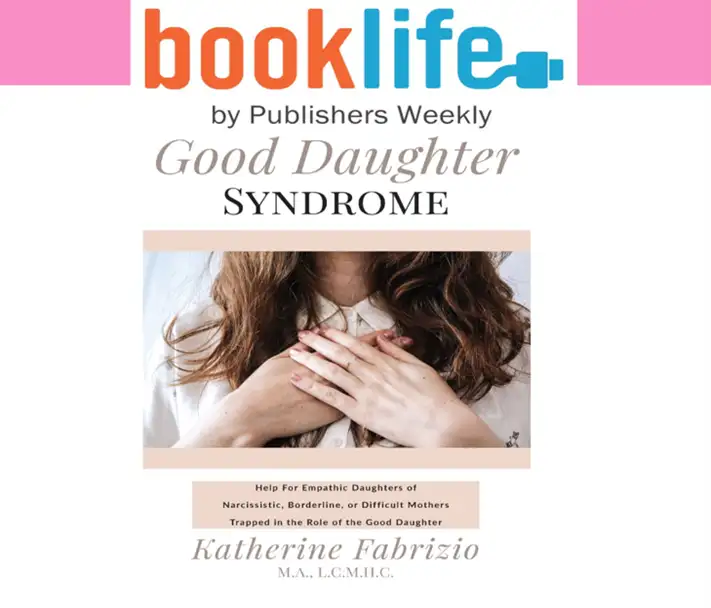The Good Daughter Syndrome®
Now Available

Praise For The Good Daughter Syndrome®



*Amazon Best-Seller in Parent and Adult Child Relationships
*#1 New Release in Parent and Adult Child Relationships
*International Firebird Book Award Winner 2024 in Mental Health & Parenting and Family Categories
*Semi-finalist in the 2023 BookLife (Publisher’s Weekly) Prize Nonfiction
*Category FINALIST in the 2024 American Writing Awards
*Forward -Clarion Rating 5.0 out of 5.0 stars –
* Currently being translated into Chinese, Spanish, Turkish
Reviews From Readers
The weight off of my chest and heart was gently but tangibly lifted with each page, and having almost reached the end, I am inspired to use my newly developed strength and feelings of empowerment which filled in the places that used to contain low self-esteem, guilt, and shame-to pay it forward and embrace every other daughter who needs such healing right now. –Jules- Amazon reviewer
Not only does she have outstanding insight, but her ability to empathize and give actionable advice is remarkable. I cannot say enough good things about this book. You won’t regret reading it! I now feel empowered to move forward in confidence as an adult daughter. –Danielle -Apple Review
All the years of therapy where I couldn’t resolve what I was feeling vs how I was being made to feel. You nailed it in one book. –Kathie Drexler -Amazon Reviewer
This book and Katherine’s keen insights have changed my perspective exponentially! –G.D. Long -Amazon Reviewer
This book has changed my life – Holly W. -Amazon Reviewer
For any daughter who feels beholden to her mother, get this book now. Your life is about to change! –Jocelyn Manzanarez -Amazon Reviewer
Thank you for saving my sanity Katherine! My only wish is that I would have found this book sooner. –Angela -Amazon Reviewer
This was an amazing, comprehensive book. I’ve read many self help books about moms and this one is the best I’ve read. –Daisey Faith -Facebook quote
Buy this book- you will not regret it.
I couldn’t believe that finally someone was speaking truth into what I’ve felt my whole life.” –D.R. -Amazon Reviewer
You can heal and feel guilt free about doing so!!! ( I ) feel for the first time ever understood and FREE!!!! –Royce Amazon Reviewer
Provides clarity and guides you with care, compassion and understanding.
Katherine and her book is here to address your “long waited for answer” questions, provide clarity on what you have been experiencing . –Marianna- Amazon Reviewer
Her insight and knowlege are invaluable!!! They have freed me of a lifetime of pain.- Amazon Reviewer
It has solved a lifetime of mysteries for me and given me the tools to make changes. –Kate K- Amazon Review
Best Yet. I’ve read a LOT of books about toxic mothers and this one hit the nail on the head with my experience. –Grateful- Amazon Reviewer
…I felt like Katherine’s approach was much more fair, professional, thorough and as kind as possible…” –Amazon Reviewer
I wish I had had this book thirty years ago! It is transformative, freeing, life- and mindset-changing. The insights and help this book gives are unparalleled by other resources… –Andi -Amazon Reviewer
She (Katherine) enabled me for the first time to experience freedom while still respecting and loving my mother,… –Amazon Reviewer
…my life changed dramatically during reading this book… –Angela -Amazon Reviewer
…I don’t have to blame or hater her, but can give myself the permission to no longer engage without guilt or shame. –Lolo5266 -Amazon Reviewer
Amazing help “I worked through therapy for about 15 years, changed about 30 therapists, went to groups, did coaching, etc. Nothing helped me as much as this book did. –OY- Amazon Reviewer
If you buy only one book on the subject of Difficult Mothers, get this one. How you can stop living for mom and start living for YOU. –Holly W. -Amazon Reviewer
Her expertise in this field surpasses other books or materials and even counseling… –Linda W –Amazon Reviewer
Such an amazing book! It literally opens your eyes and is so well done. –Amazon Reviewer
A must-read for sensitive women who ache for real-world wisdom to help them navigate the often-difficult mother-daughter terrain. –Brynne Betz, M.A. -Amazon Reviewer
This [book] has really opened my eyes – and shown me a way out… –Taty -Amazon reviewer
I don’t feel guilt anymore and this is liberating! –Amazon reviewer
Her insight and knowledge are invaluable!!! They have freed me of a lifetime of pain. –Amazon Reviewer
Reading the Good Daughter Syndrome was like receiving a key that unlocked invisible bars that had been keeping me trapped. –SV- Amazon Reviewer
The author has deep insight and provides real tools to help you move forward. 5/5 recommend to those recovering from difficult childhood relationships. –Amazon Reviewer
My only regret is that I could not find it (the book) earlier. This book is an INVALUABLE RESOURCE for any woman struggling to break free from or better manage an unhealthy, dysfunctional relationship with her mother. –Amazon Reviewer
She understands the problems, the process, and most importantly, explains them to the reader in layman’s terms! –Stephanie- Amazon Reviewer
You have written a sheer MASTERPIECE of EVERYTHING I needed to survive.
I feel free for the first time in my life. -Chris M- Amazon Reviewer
It is an essential resource for therapists and daughters looking to reclaim their authentic selves and lead lives filled with self-compassion, resilience, and inner peace. –Taylor Damiani, Ph.D.-Amazon Reviewer
The very real techniques and tools presented in this book for the sensitive daughter struggling with a difficult mother are what many people have paid thousands of dollars to learn via talk therapy. –Brynne B. Amazon Reviewer
Why you never feel good enough, can’t stand up to your difficult mother or set healthy boundaries without feeling guilty…and what to do about it
Are you fed up and at your wit’s end with your Mother?
Do you attempt to set a boundary with your difficult mother, but instead cave or back off at the first sign of pushback?
Are you stopped in your tracks by debilitating guilt you don’t fully understand?
Do you find yourself saying, “It’s just not worth it.” every time you try to confront your Mother’s behavior?
You know something is wrong with your relationship with your Mother, but feel powerless to escape the toxicity.
If yes, you may be playing the role of the Good Daughter.
So, how can you break away from your difficult mother?
Most people (including most therapists and every self-help book out there) will tell you to stand up to Mom, set healthy boundaries, and learn to say “no.”
Sounds good, right?
That’s excellent advice! …so why doesn’t it help?
Why can’t you make yourself do what you know you ‘should’ do?
Good Daughters make unconscious agreements (in childhood) that trap them into putting their mother’s needs ahead of their own.
I call these the Good Daughter traps.
Ironically, the Good Daughter strives to be “good” for mom, hoping one day Mom will give her the approval she craves and permission to break away and live her own life. Yet, in doing so, she sinks further and further into the quicksand of her mother’s dysfunction. She has been programmed to make up for Mom’s deficits no matter what it costs her.
If you identify as a Good Daughter, unless you escape these traps, you will remain buried alive underneath your mother’s needs.
You can’t see the traps.
But I can.
What’s more, I know what you are missing.
It isn’t that you lack willpower or intelligence. No, you are only obeying the evolutionary programming designed to keep you alive.
It’s hard, if not impossible, to break the agreements mother nature compelled you to make for your survival, impossible if you don’t know what they are.
Bound by these four agreements, daughters who are programmed to look good for Mom (and make sure Mom is good) are complicit in the very dynamic they are desperate to escape.
If you only knew that YOU have the power to change it.
But, unfortunately, no one has told you this.
But I will.
The first book of its kind, The Good Daughter Syndrome® (Now available for preorder here.), reveals these hidden agreements and accompanying false core beliefs that trap daughters of difficult mothers into taking care of Mom and keep daughters from breaking free.
The Good Daughter Syndrome® spells out the formula for breaking out of this dysfunctional disempowering dynamic.
You can now escape from the traps into sovereignty, wholeness, and freedom.



